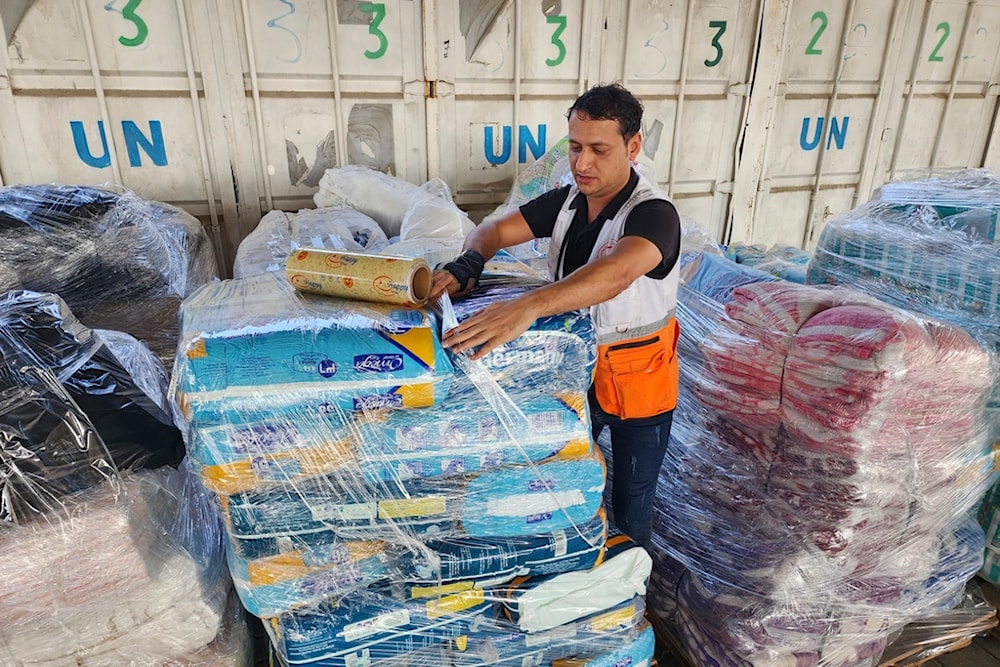Israeli 'deconfliction process' worst ever, UNRWA in 'survival mode'
US Democratic Senator Chris Van Hollen explains in an interview that the Israeli occupation has refused to allow basic needs to the Gaza Strip, including water-filtration systems.
-

United Nations and Red Crescent workers prepare the aid for distribution to Palestinians at UNRWA warehouse in Deir al-Balah, Gaza Strip, occupied Palestine, on Monday, Oct. 23, 2023. (AP)
US Senator Chris Van Hollen, who had recently visited the Rafah border crossing alongside US Senator Jeff Merkley, both of whom are Democrats, said during an interview for CBS that the Israeli screening process of supplies entering through the crossing is "unnecessarily cumbersome".
According to van Hollen, "There are two big things that are happening" at the crossing that are hindering the entrance of aid to the people of the Gaza Strip. First, according to Van Hollen, was "the unnecessarily cumbersome process, going through the Israeli screening process, which I believe is the result of political decisions by the [Israeli Prime Minister Benjamin] Netanyahu coalition."
On this note, Van Hollen explained that "Israel" has rejected basic needs, some of which were offered by UNICEF. He spoke of an incident that had happened in front of his eyes where a truck that had a big box from UNICEF was turned away, adding, "It was a unit to help with water desalinization. It was rejected."
Van Hollen then emphasized that "when one item on a truck is rejected, the entire truck is rejected."
Similarly, items that the US Senator says should've been allowed into the Strip, such as water filtration systems, were also found in the "warehouse of rejected items."
Secondly, the other major problem was the "so-called deconfliction process" which Van Hollen explained as being a "fancy name" for security guarantees to those who are "providing humanitarian assistance," which will give them the "confidence that they can deliver it without being killed."
The US Senator then explained that international NGOs that have operated in various conflict zones in the past, which they had spoken to while in Rafah, said, "They've never seen a worse process for assuring the safe delivery of humanitarian assistance."
“People are trying their best to live their lives and take care of their children”@ScottAnderGaza tells @CNN he doesn’t know how much more people in 📍#Gaza can bear in these dire conditions, without sufficient food, shelter, water and any basic amenities. pic.twitter.com/QMmfCacd2E
— UNRWA (@UNRWA) January 7, 2024
Gaza situation deteriorates
Scott Anderson, UNRWA Gaza Deputy Director, told CNN that "the levels of hunger are quite severe in Gaza," explaining that "the further up you go" from Rafah, the situation "gets worse".
According to Anderson, UNRWA, on the one hand, has been "making a concerted effort to try to import more food into Gaza and make sure it gets to people in need, including the 1.4 million people in the Rafah governorate."
On the other hand, UNRWA has become "very much in life-saving mode and trying to make sure that we get things to people that they need." The UNRWA Deputy then explained that the hospital network in Gaza "has been severely damaged" and has "almost collapsed" as bed capacity skyrockets "well over 300% for regular beds and well over 200% for ICU."
This also came after "organizations like Medecins Sans Frontier…have had to evacuate hospitals where they were providing support" due to the worsening security situation.
"The largest concern I would have is, the pressure on people is extraordinary and I don’t know how much more they can bear before something explodes in the southern part of Gaza within the civilian population which would impact the UN and other international humanitarians’ ability to respond to the ongoing operation," said Anderson.
Read more: UNRWA says its Gaza facilities were damaged 128 times since Oct. 7

 3 Min Read
3 Min Read








